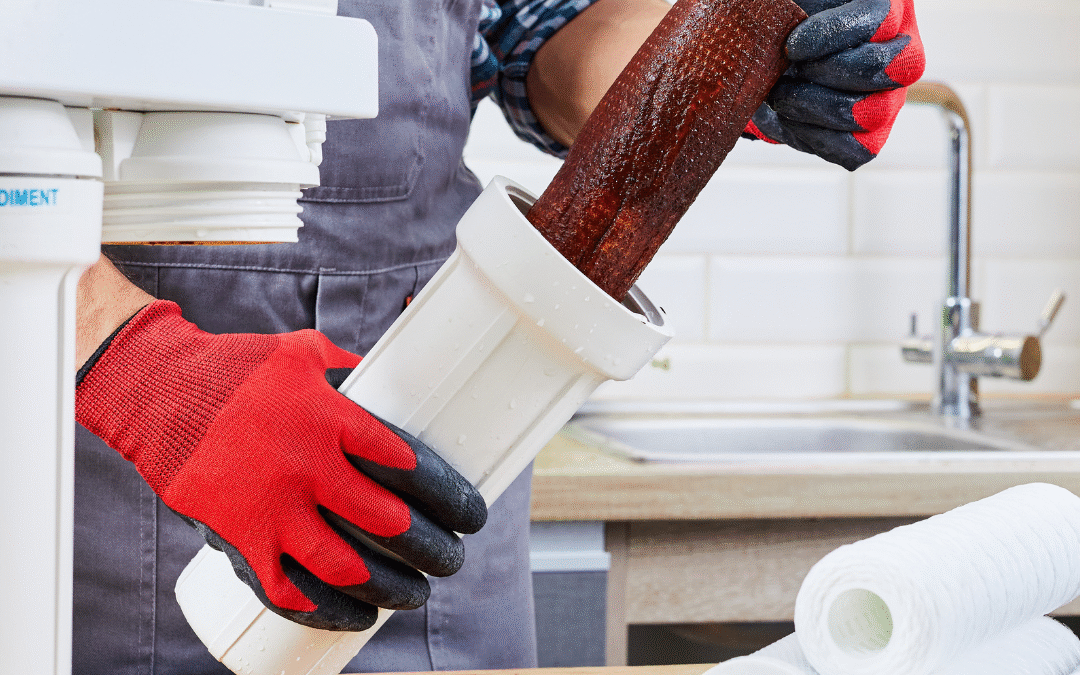When it comes to improving your home’s water quality, the options can feel overwhelming. Should you install a water conditioner? A filter? Or both?
The truth is, conditioners and filters serve different purposes, and understanding the difference will help you choose the best solution for your family. At A+ Services, we’ve guided homeowners across Northern Kentucky and Greater Cincinnati through this decision—and here’s what you should know.
Table of Contents
What Is a Water Conditioner?
A water conditioner is designed to address hard water problems, which are extremely common in our region. Hard water contains high levels of calcium and magnesium that cause:
- White spots on dishes and glassware.
- Soap scum buildup in sinks and tubs.
- Scale inside water heaters, pipes, and appliances.
- Dry skin and dull hair.
Conditioners don’t remove minerals the same way traditional water softeners do. Instead, they alter the structure of calcium and magnesium ions so they don’t stick to surfaces. This prevents scaling and buildup, while still leaving minerals in the water.
Best for: Homeowners frustrated by appliance damage, scale buildup, or hard water effects on skin and laundry.
What Is a Water Filter?
Water filters target contaminants, not minerals. Depending on the type of filter, they can reduce or remove:
- Sediment (sand, dirt, or rust particles).
- Chlorine and disinfection byproducts.
- PFAS (“forever chemicals”).
- Lead from older plumbing.
- Pesticides, fertilizers, and other impurities.
Filters are available as whole-home systems (treating every tap in the house) or point-of-use systems (like under-sink or faucet filters for drinking and cooking water).
Best for: Families concerned about water taste, odor, or contaminants that could impact health.
Types of Water Filters and How They Work
Not all water filters are the same. Each type targets different particles or contaminants, which is why many homeowners combine them for the best results. Here are three of the most common types of filters used in homes:
1. Pleated Filters
Pleated filters are made from layers of folded polyester or cellulose, creating a large surface area to trap particles.
- Best for: Sediment like sand, dirt, silt, and rust.
- How it works: Water flows through the pleated material, and the folds capture debris. The more pleats, the greater the filtration capacity.
- Home benefits: Keeps faucets, showerheads, and appliances free from clogging and sediment buildup.
2. Melt-Blown Filters
Melt-blown filters are made from fine polypropylene fibers bonded together, forming a dense structure that captures very small particles.
- Best for: Fine sediment, silt, and microscopic debris that pleated filters may miss.
- How it works: Water passes through multiple layers of fibers, gradually removing particles as it moves deeper into the filter.
- Home benefits: Excellent for protecting sensitive appliances or systems, like tankless water heaters, from clogging or premature wear.
3. Carbon Filters
Carbon filters are among the most popular choices for improving water taste and safety.
- Best for: Chlorine, disinfection byproducts, pesticides, herbicides, and volatile organic compounds (VOCs). Some advanced carbon filters can also reduce PFAS and lead.
- How it works: Activated carbon has a porous structure that adsorbs (traps) chemicals and contaminants as water passes through.
- Home benefits: Fresher, better-tasting water for drinking and cooking, plus peace of mind against chemical contaminants.
Choosing the Right Filter for Your Home
Each filter has its strengths: pleated and melt-blown filters are excellent for sediment control, while carbon filters target chemical contaminants and improve taste. Many whole-home water treatment systems combine different types of filters in stages, ensuring your water is clean, safe, and comfortable to use from every tap.
Key Differences Between Conditioners and Filters
| Feature | Water Conditioner | Water Filter |
|---|---|---|
| Main Purpose | Prevents scale buildup from hard water | Removes contaminants and impurities |
| Health Impact | Doesn’t remove minerals; safe to drink | Can reduce harmful chemicals, lead, etc. |
| Appliance Protection | Protects water heaters, dishwashers, pipes | Limited impact on scale issues |
| Best For | Hard water problems (common in NKY & Cincy) | Improving taste, odor, and safety |
Do You Need One—or Both?
For many homeowners, the best solution is a combination of both. A conditioner protects your plumbing and appliances from scale damage, while a filter ensures clean, great-tasting water for drinking and cooking.
The right choice depends on your priorities:
- If your dishes are spotty, laundry feels stiff, and your water heater struggles, a conditioner may be your first step.
- If your water smells like chlorine, tastes metallic, or you’re worried about contaminants, a filter is the better choice.
- If you want to solve both issues, pairing a conditioner with a filter gives your home full coverage.
How A+ Services Helps
At A+ Services, we specialize in plumbing and water treatment solutions for homeowners across Covington, Florence, Independence, and Greater Cincinnati. Our licensed team can:
- Test your water quality.
- Identify whether hard water, contaminants, or both are the problem.
- Recommend the right system for your home and budget.
- Provide expert installation with flat-rate, upfront pricing.
Water conditioners and filters aren’t one-size-fits-all solutions—they target different issues. By understanding what’s in your water, you can make a confident choice that protects your family’s health, your appliances, and your home’s plumbing system.
Not sure which option is right for you? Contact A+ Services today for a water quality consultation and let our experts guide you to the best solution.

